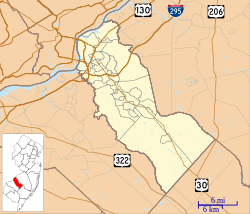Hinchman-Lippincott House
Hinchman-Lippincott House | |
 | |
| Location | 1089 North Park Avenue, Haddon Heights, New Jersey |
|---|---|
| Coordinates | 39°52′48″N 75°03′59″W / 39.88008°N 75.06631°W |
| Built | c. 1699 |
| Architect | Francis Collins |
| Architectural style | Greek Revival, Georgian |
| MPS | Haddon Heights Pre-Revolutionary Houses MPS |
| NRHP reference No. | 94001121[1] |
| NJRHP No. | 965[2] |
| Significant dates | |
| Added to NRHP | February 17, 1995 |
| Designated NJRHP | February 28, 1990 |
The Hinchman-Lippincott House is located at 1089 North Park Avenue in Haddon Heights of Camden County, New Jersey, United States. The house was built c. 1699 and added to the National Register of Historic Places on February 17, 1995, for its significance in architecture and exploration/settlement. It is part of the Haddon Heights Pre-Revolutionary Houses Multiple Property Submission (MPS).[3]
History
[edit]The Hinchmann-Lippincott house is associated with the earliest founders of Haddon Heights, New Jersey. The first permanent settlement in the Haddon Heights area was established by various families from Flushing, New York. John Hinchmann purchased a 1000-acre plot from John Hugg in 1699.[3]
In the early 1700s John Hinchmann built two farmhouses on the property: the Hinchmann-Lippincott House and the Col. Joseph Ellis House.
The Hinchmann family owned the property until it was divided and sold by Isaac Hinchmann in 1762. The Hinchmann-Lippincott House and 100 acres was bought by David Hurley. In 1807, James Hurley sold the property, including the house, to Nathaniel Lippincott. Benjamin Lippincott, who built the first railroad station in Haddon Heights, was also the last Lippincott to live in the house.[3] In the early twentieth century, he subdivided the land for housing.
See also
[edit]References
[edit]- ^ "National Register Information System – (#94001121)". National Register of Historic Places. National Park Service. March 13, 2009.
- ^ "New Jersey and National Registers of Historic Places – Camden County" (PDF). New Jersey Department of Environmental Protection - Historic Preservation Office. September 29, 2022. p. 9.
- ^ a b c Morrison, Craig (August 1988). "National Register of Historic Places Inventory/Nomination: Hinchman–Lippincott House". National Park Service. With accompanying 7 photos
- Houses on the National Register of Historic Places in New Jersey
- Georgian architecture in New Jersey
- Houses completed in 1699
- Houses in Camden County, New Jersey
- National Register of Historic Places in Camden County, New Jersey
- Haddon Heights, New Jersey
- New Jersey Register of Historic Places
- 1699 establishments in New Jersey
- Colonial architecture in New Jersey




